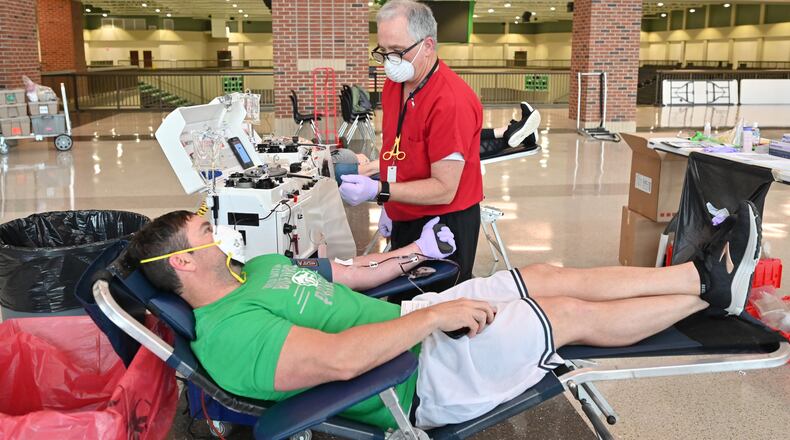Blood supplies in Georgia and across the country remain at critically low levels after the American Red Cross announced an emergency shortage earlier this month. The recent spell of cold weather led not only to local school closures but also to the cancellation of nine blood drives in Georgia.
The organization said it is now seeing the lowest number of people donating blood in 20 years. Red Cross officials say hospitals’ need for blood products are outpacing the number of blood donations coming in.
This means the Red Cross, which says it supplies about 40% of the nation’s blood donations, has had to limit distributions of some of the most transfused blood types to hospitals, according to Jerrica Williams, regional communication manager for the American Red Cross of Georgia.
While the need for blood is constant, representatives for hospitals in metro Atlanta, including Emory Healthcare, Piedmont Hospital and Grady Memorial Hospital, said they are not experiencing a blood shortage at this time.
Dr. Baia Lasky, divisional chief medical officer for the Georgia region of the American Red Cross Biomedical Services, said while Georgia was not as impacted as other states by weather-related cancellations of blood drives, “everywhere is running at lower levels, which puts you in a precarious situation.”
Other blood donation organizations are also reporting inventories running low. Blood Assurance, a supplier of blood to hospitals in Alabama, Georgia, Kentucky, North Carolina and Tennessee, recently asked 70 hospitals, including 11 in Georgia, to briefly stop elective surgeries due to a blood shortage. They asked the hospitals to delay the elective surgeries a few days to allow time to rebuild its inventory. It cited severe winter weather and the need for blood transfusions as the reasons for the shortfall.
It wasn’t immediately clear if any of the hospitals that use Blood Assurance products would suspend elective surgeries. Two of them reached by The Atlanta Journal-Constitution said they were continuing normal surgical procedures.
The American Red Cross has not called for delays in surgeries, saying it “does not determine patient care, however, we urgently encourage blood and platelet donors to donate to help ensure lifesaving medical procedures are not put on hold.”
Blood donations are essential for surgeries, cancer treatment, chronic illnesses, and traumatic injuries.
Type O blood is routinely in short supply and in high demand by hospitals – both because it is the most common blood type and because type O-negative blood is a universal donor — meaning people with any blood type can receive it.
In sounding the alarm, the American Red Cross of Georgia is hosting hundreds of blood drives across the state. The organization also has nine sites for blood, platelet, and plasma donations in the state. The Red Cross is calling for donors of all types – but especially those with type O blood to give now.
To find a blood drive close to you, go to www.redcrossblood.org.
Credit: custom
Credit: custom
Several factors are playing a role in the decline in blood donations including a steady drop in the number of young adults donating blood since 2013, according to the federal National Blood Collection and Utilization Survey.
But the COVID-19 pandemic, which led to many people staying home and working remotely has made it increasingly challenging to host blood drives.
In 2019 before the COVID pandemic, the number of first-time donors in Georgia was around 38,000, according to the American Red Cross of Georgia. In 2023, the number of first-time donors was only about 23,000.
Only about 3% of age-eligible people in the U.S. donate blood yearly, according to the organization’s latest estimates.
One car accident victim might need up to 100 units of blood during a transfusion, according to the Red Cross. On average in Georgia, the Red Cross collects only about 26 units of blood per mobile blood drive.
Keyera Jennings, a a sickle-cell patient who relies on blood transfusions, is concerned about declining blood donations. Every month, she undergoes an exchange transfusion which involves removing a patient’s sickle-shaped red cells and replacing them with normal red cells from donated blood. Jennings, who is a volunteer advocate for the American Red Cross of Georgia, said an exchange transfusion was delayed a couple of years ago because of a shortage.
“I was sick and dizzy and couldn’t get out of bed,” said Jennings. “It was very scary. ... These blood exchanges have been life-changing and without them, I wouldn’t be able to live life fully.”
About the Author







